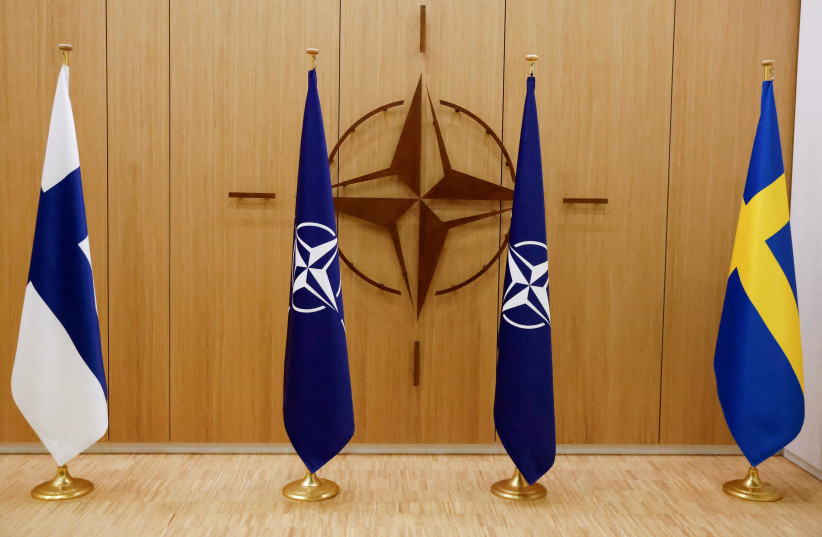Important NATO summit kicks off this week – analysis
US President Joe Biden arrived in the UK late Sunday as he begins a trip that will take him to the important NATO summit in Vilnius in Lithuania. He is also expected to go to Finland, the newest member of NATO.
At Vilnius a key item on the agenda will the Russian invasion of Ukraine as well as discussions about Sweden being permitted to join NATO.
Sweden, a democracy, has been prevented from joining NATO by the far-right government in Turkey. Ankara claims Sweden hasn’t done enough against “terrorism,” while Ankara’s government generally accuses most critics and protesters of being “terrorists,” creating a difficult hurdle for Sweden. Biden would like to iron out this dispute.
The NATO summit is important and has wider implications. For instance, Finland is acquiring David’s Sling, the air defense system jointly developed by Israel and the US. Israel’s Defense Ministry recently announced that the system completed a new series of tests.
At the same time the question of NATO’s relationship with Ukraine is important as is the discussion about the US sending cluster munitions to Kyiv.
The NATO summit will be followed by countries around the world. According to an important article at Arab News by Yasar Yakis “there is a visible difference between the support extended to NATO by the Baltic and Eastern European countries and the remainder of the European NATO countries in general.
Some 3,000 government representatives from 50 countries are expected to participate in the summit. Another group of 2,000 media and nongovernmental organization representatives are expected to arrive in Vilnius.”
 A view of the flags of Finland, NATO and Sweden during a ceremony to mark Sweden’s and Finland’s application for membership in Brussels, Belgium, May 18, 2022. (credit: REUTERS/JOHANNA GERON)
A view of the flags of Finland, NATO and Sweden during a ceremony to mark Sweden’s and Finland’s application for membership in Brussels, Belgium, May 18, 2022. (credit: REUTERS/JOHANNA GERON)What will be addressed at the NATO summit?
He notes that this is a huge amount of people arriving in Vilnius, which is a city of half a million residents. “This summit will be the biggest meeting that Lithuania has ever hosted. Schengen practices were suspended on the borders of Lithuania one week ahead of the summit.
And air traffic will be suspended on the days the meeting takes place.” NATO is trying to get countries to increase their military spending. The war in Ukraine has certainly created a feeling that Europe must finally bring militaries up to a standard capable of fighting conventional wars.
That has meant big business for defense companies, including in Israel. For instance, Israel was a big player at the recent Paris Air Show and Israel is selling the Arrow air defense system, jointly developed with the US, to Germany. European countries are transferring older military equipment to Ukraine and upgrading rapidly. Eastern European countries are also doing this.
However there are supply chain problems. Ukraine is using a lot of munitions and the West can’t keep up. Russia’s goal is to slowly attrition Ukraine, dragging the war out. Moscow wants to fortify its positions in Ukraine and do what Germany tried to do to France in 1917, basically “bleed Ukraine white” as was done at Verdun to the French 100 years ago. Ukraine’s current offensive is still taking place, but many wonder whether it will eventually make real gains.
Yakis points out that the NATO budget issue is a real concern. “In 2023, only 11 out of 31 member states will fulfill their promise to keep their defense budget above 2% of GDP. They are the US, the UK, the three Baltic countries (Latvia, Lithuania and Estonia), Finland, Poland, Greece, Hungary, Slovakia, and Romania. They are largely the countries that are exposed to the Russian threat.” He also notes regarding Turkey that Ankara’s “military budget share of GDP is below 2%.”
Biden is doing outreach to Turkey, he already made a phone call to Ankara’s leader and is expected to meet Recep Tayyip Erdogan as well. Turkey wants more F-16s from the US. The US Congreess, angry that Turkey has frequently threatened other allies, such as Greece and that Ankara uses F-16s to target US-backed anti-ISIS fighters in Syria, is loathe to give Turkey more weapons. The Biden administration has been begging Ankara for a year to let Sweden join NATO. It has not been successful.
An article at France24 also notes there are other challenges. For instance, it notes that there was a difficulty to find a compromise over who next the leader of NATO might be. “Perhaps the most difficult questions are over how Ukraine should be eased into NATO. Some maintain admitting Ukraine would fulfill a promise made years ago and be a necessary step to deter Russian aggression in Eastern Europe,” the article notes.
In Russia, Moscow appears pleased with these controversies. For instance, Moscow’s state media reported that Ukraine is not optimistic about the NATO meeting. Russia is also reportedly sending Russian Foreign Minister Sergey Lavrov to hold the 6th ministerial meeting of strategic dialogue between Russia and the Cooperation Council for the Arab States of the Gulf in Moscow on Monday.
This means Russia is looking to the Middle East for new partnerships. France is also expanding ties with the region, it has signed an MOU with Saudi Arabia regarding energy, with a focus on clean energy, according to various reports.





Comments are closed.